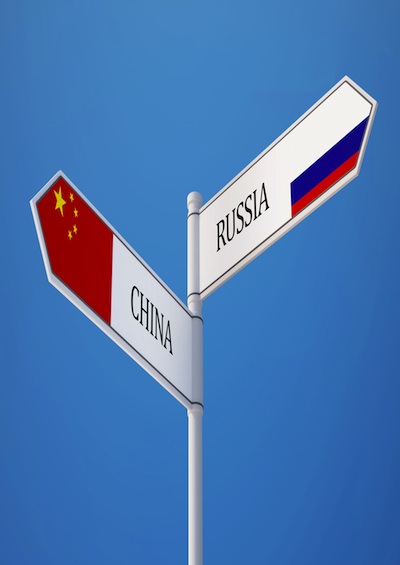China Loves a Weaker Russia
Why may China want to support Ukraine – even if it means quarrelling with Putin?
September 16, 2014

Ever since Vladimir Putin annexed Crimea, China has studiously avoided criticizing Russia’s actions.
Needless to say, it has not joined the United States and its allies in imposing economic sanctions. On the contrary, China has benefited from the situation. Russia and China concluded a gas deal in May. Vladimir Putin also personally broke ground for the construction of the 2,500-mile Power of Siberia pipeline that Russia will build largely at its own expense to deliver its gas to China.
That was one of many agreements currently in the works. For example, state-owned oil giant Rosneft has invited the Chinese to take a stake in its third-largest oilfield and aluminum producer Rusal and is planning a joint project in Eastern Siberia.
Similarly, with the imposition of Western sanctions and signs of a new Cold War, Chinese consumer goods will start replacing many Western ones. After all, China has already replaced Germany as the largest exporter to Russia.
China and Russia: Not natural partners
However, the profits China has so far reaped by being chummy with Putin over Ukraine are overstated. Siberia’s natural resources will go to China in any case, simply because it is nearby and China has the money to pay for them.
In early 2013, long before Russia quarreled with the West over Ukraine, Rosneft borrowed $2 billion from China and signed a $270 billion contract with China National Petroleum Corporation. These deals would have happened even if Russia’s relations with the West had been good.
Meanwhile, the Russian economy is already reeling from the sanctions that have been imposed so far. The ruble has fallen to a record low and Russia’s financial system is starting to come apart.
The Russian consumer market may prove much less of an El Dorado for Chinese exporters than it has been for European producers, while Russia was earning $300 billion annually from its oil and gas exports to Europe.
A financial crisis with worldwide ramifications
Worse, if sanctions are tightened, Russia may end up defaulting on its $700 billion of public and private hard currency debt, potentially triggering a financial crisis with worldwide ramifications.
More broadly, Putin has made no secret of his desire to undermine the global financial system. This is not a prospect China relishes.
Unlike Russia, which chose to remain, in the words of U.S. Senator John McCain, “a giant gas station pretending to be a real country,” China has done well out of the current dollar-based system. China’s hard currency reserves are worth $4 trillion, much of it are held in dollars and dollar-denominated financial instruments.
Beyond economic concerns loom geopolitical considerations. Putin has claimed repeatedly that the United States and Europe want to weaken Russia. Nothing can be further from the truth because a stable, prosperous and peaceful Russia would make Europe safer.
Ideally, the West would like Russia to be closely integrated with the EU.
China benefits from a weaker Russia
Not so China. It has one of the world’s longest borders and a long history of conflict with its northern neighbor. In this respect, Putin suits China well, because he antagonizes the West and weakens Russia economically.
With sanctions cutting Russia’s access to modern technology, its military will not be able to modernize. Meanwhile, China is spending massive amounts (no one is sure exactly how much) on bringing its military into the 21st century.
Beijing has strong interests in post-Soviet Central Asia, including a number of highly lucrative natural resource deals.
That is one region where China itself sees Putin as far too aggressive. Russia’s president recently declared that Kazakhstan, a former Soviet republic, has never been an independent state.
Why would he argue that? Because northern Kazakhstan is heavily Russian-speaking. The Kazakhs took it as an indication that Putin, with his “Russia is where Russian speakers live” doctrine, may try to foment trouble there, too.
Such regional concerns aside, China’s statecraft goes well beyond worrying about a territorial acquisition-minded Russia. Lest we forget, China has huge territorial claims in eastern Siberia and the Russian far east, the territories that the Russian Empire grabbed in the mid-19th century.
The region is already heavily Chinese and the Chinese government encourages its citizens to settle north of the border.
The only realistic way in which China could acquire those territories is if Russia’s central authority were to weaken substantially. Surely, the Chinese remember how the Soviet Union got bogged down in Afghanistan and eventually fell apart.
China’s Ukraine card
That is where Ukraine comes into the equation. The situation there may bog down Russia more than it is currently prepared to acknowledge.
And then, there is Ukraine itself. For China, getting a friend on Russia’s western border is an alluring geopolitical proposition.
In a tit-for-tat move, it would mirror Russia having a client state on China’s southern flank. Beijing is well aware that Moscow is selling submarines and military planes to Vietnam.
Ukraine is valuable on its own, too. It used to be a breadbasket of Europe before the Bolshevik revolution and it could become one again. Late last year, before Russia’s annexation of Crimea, China was going to invest $13 billion to build a unique deep-water port, to transport Ukrainian grain and other commodities. The two countries also cooperate in the armaments industry.
Support for Ukraine could open a new chapter in China’s emergence as a global player. Ukraine has a crucially important strategic location, which Washington and Brussels seem to underestimate. It could hold a key to central and southern Europe and it is a cornerstone of an “unallied block” that includes Belarus, Moldova and, in economic terms, Turkey.
China’s leaders may find Ukraine too attractive a prize to pass up, especially if lack of support from the United States and Europe for its struggle against Putin’s aggression tosses it into their lap.
Takeaways
Putin has made no secret of his desire to undermine the global financial system. This is not a prospect China relishes.
Ideally, the West would like Russia to be closely integrated with the EU.
Putin says the United States and Europe want to weaken Russia. Nothing can be further from the truth.

